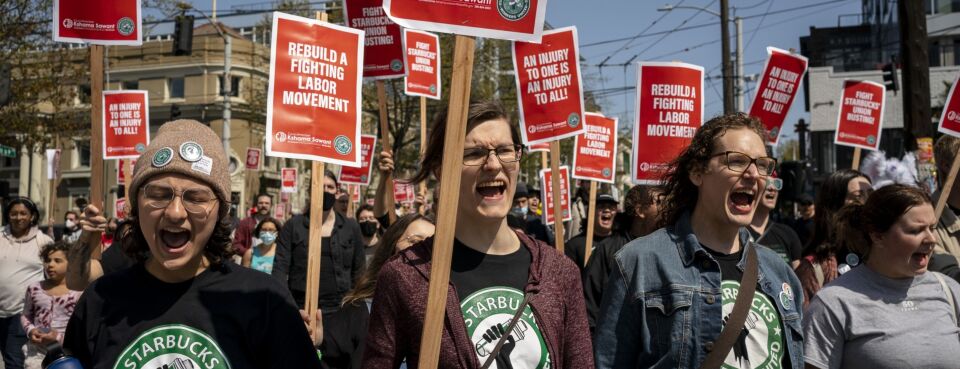
Travis Lavenski is a student at Harvard Law School.
Welcome back OnLabor readers! In today’s News & Commentary, Starbucks hit with a Board complaint for failure to negotiate with multiple stores; Trader Joe’s workers in Minneapolis walk off the job; Republicans plan to attack Congressional workers’ right to organize; and the Supreme Court is set to hear oral arguments for the important Glacier Northwest case next week.
Starbucks Coffee continues to make headlines in its response to the unionization wave that has occurred in its stores for just over a year now. The NLRB filed a complaint against the coffee giant for refusing to negotiate with 21 stores in Washington and Oregon. The complaint follows a recent Board ruling that Starbucks has failed to negotiate at a Seattle roastery location. This marks the first time the Board has filed a complaint against the store for failure to bargain with multiple locations, though similar complaints may come soon. Starbucks has racked up 50 Board complaints totaling to over 1,000 labor law violations before year’s end.
Workers at a unionized Trader Joe’s store in Minneapolis walked out on New Year’s Eve. The workers, who unionized this summer, staged a walkout after the company cut hours for union-supporting workers and increased hours for new hires. Workers also demanded the company to bargain fairly and swiftly. This Trader Joe’s location is one of two unionized stores in the country. In response to union organizing drives at multiple locations thus summer, Trader Joe’s hired notorious union-busting law firm Littler Mendelson. MorePerfectUnion released this short video last month detailing workers’ fight for a contract in the workers’ own words.
On the first day of 2023, House Republicans released a rules package for the 118th Congress which states the party’s intention to, among other things, “eliminate Democrats’ creation of House staff labor unions so that congressional staff are accountable to the elected officials they serve.” Congressional workers are not covered by the NLRA, thus only received the right to organize last year after the 117th House passed a resolution. “We organized and unionized offices in the 117th Congress, and we’re going not to stop in the 118th Congress,” the Congressional Workers United tweeted in response. “When we fight, we win, and we’re ready to take on any anti-worker battles that may come our way.” There is some question about whether the House Republicans can lawfully strip away this right through a rules package. As David Dayen of the American Prospect explained on Twitter, “last year’s House resolution on staff unions just implemented a provision of the Congressional Accountability Act of 1995. [It’s n]ot certain a rules package can take that away.”
Looking forward, the Supreme Court is set to hear oral arguments for the Glacier Northwest case on January 10. The technical question in the case is whether the NLRA preempts an employer’s state tort claim for intentional destruction of property during a labor dispute. Practically, a decision for the employer could further chill unions’ right to strike, as the threat of a lawsuit would loom after any decision to go out of strike. For a more in-depth look at the stakes of this decision, see Ben’s previous OnLabor post here.






Daily News & Commentary
Start your day with our roundup of the latest labor developments. See all
March 4
The NLRB and Ex-Cell-O; top aides to Labor Secretary resign; attacks on the Federal Mediation and Conciliation Service
March 3
Texas dismantles contracting program for minorities; NextEra settles ERISA lawsuit; Chipotle beats an age discrimination suit.
March 2
Block lays off over 4,000 workers; H-1B fee data is revealed.
March 1
The NLRB officially rescinds the Biden-era standard for determining joint-employer status; the DOL proposes a rule that would rescind the Biden-era standard for determining independent contractor status; and Walmart pays $100 million for deceiving delivery drivers regarding wages and tips.
February 27
The Ninth Circuit allows Trump to dismantle certain government unions based on national security concerns; and the DOL set to focus enforcement on firms with “outsized market power.”
February 26
Workplace AI regulations proposed in Michigan; en banc D.C. Circuit hears oral argument in CFPB case; white police officers sue Philadelphia over DEI policy.